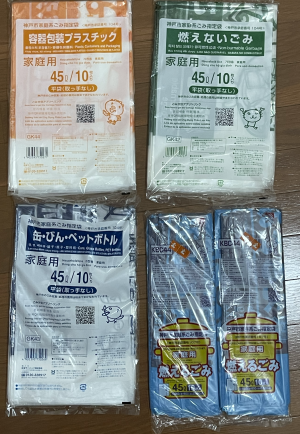Garbage Disposal: Difference between revisions
Created page with "alt=Trash bags in Kobe City|thumb|Trash bags in Kobe City, Hyogo Prefecture (plastic containers and packaging; non-combustible garbage; cans, glass bottles, PET bottles; combustible Garbage).<ref>[https://www.city.kobe.lg.jp/a04164/kurashi/recycle/gomi/dashikata/shigen/shitebukuro/index.html 神戸市家庭系ごみの指定袋制度]</ref> In Japan, trash disposal rules vary depending on the municipality. For example, the days on which co..." |
|||
| (2 intermediate revisions by one other user not shown) | |||
| Line 8: | Line 8: | ||
* '''Incombustible waste:''' This includes metal, glass, and ceramic. | * '''Incombustible waste:''' This includes metal, glass, and ceramic. | ||
* '''Recyclables:''' This includes plastic bottles, cans, and paper. | * '''Recyclables:''' This includes plastic bottles, cans, and paper. | ||
* '''Oversized garbage:''' This includes furniture, futon and large home appliances (refrigerator, TV, washing machine etc.) | |||
It is also important to '''use the appropriate trash bags'''. Residents must use the appropriate bags for each type of garbage. These bags are usually sold at supermarkets, convenience stores, and hardware stores. Some municipalities have stricter rules: using only designated bags is mandatory. | It is also important to '''use the appropriate trash bags'''. Residents must use the appropriate bags for each type of garbage. These bags are usually sold at supermarkets, convenience stores, and hardware stores. Some municipalities have stricter rules: using only designated bags is mandatory. | ||
Latest revision as of 15:50, 6 March 2024

In Japan, trash disposal rules vary depending on the municipality. For example, the days on which combustible waste and plastic are collected are different. Even Japanese people sometimes find it difficult to understand the rules. It is likely that it is even more difficult to explain the rules to foreigners, and there are many reports of foreigners making mistakes when disposing of trash.
Rules
The most important rule is to segregate trash properly. In most municipalities, trash is divided into the following categories:[2]
- Combustible waste: This includes food scraps, paper, and cardboard.
- Incombustible waste: This includes metal, glass, and ceramic.
- Recyclables: This includes plastic bottles, cans, and paper.
- Oversized garbage: This includes furniture, futon and large home appliances (refrigerator, TV, washing machine etc.)
It is also important to use the appropriate trash bags. Residents must use the appropriate bags for each type of garbage. These bags are usually sold at supermarkets, convenience stores, and hardware stores. Some municipalities have stricter rules: using only designated bags is mandatory.
Additionally, be aware that each type has its own disposal day, and schedules may change during holidays. Check the city website or announcements for updated information.

Why It Is Important to Follow the Rules
There are several reasons why it is important to follow the trash disposal rules in Japan. First, properly sorted trash can be recycled or composted. This helps to reduce waste and protect the environment.
Second, not following the rules can lead to trash not being collected. This can be a nuisance for everyone in the neighborhood.
Third, not following the rules can be considered rude. In Japan, it is important to be considerate of others, and following the trash disposal rules is a way of showing respect for your community.
Tips for Foreign Residents
If you are a foreign resident in Japan, here are a few tips for following the trash disposal rules:
- Check with your local municipality to find out the specific rules for your area.
- Ask your neighbors or friends for help.
- Be patient and persistent. It may take some time to learn the rules.
Conclusion
Following the trash disposal rules in Japan is important for a number of reasons. By properly sorting your trash, you can help to reduce waste, protect the environment, and be a good neighbor.
